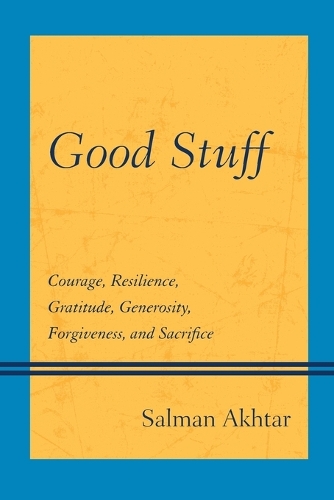
Good Stuff: Courage, Resilience, Gratitude, Generosity, Forgiveness, and Sacrifice
(Paperback)
Publishing Details
Good Stuff: Courage, Resilience, Gratitude, Generosity, Forgiveness, and Sacrifice
By (Author) Salman Akhtar
Bloomsbury Publishing PLC
Rowman & Littlefield Publishers
12th June 2014
United States
Classifications
Professional and Scholarly
Non Fiction
Psychotherapy
616.8917
Physical Properties
Paperback
220
Width 155mm, Height 227mm, Spine 18mm
331g
Description
Good Stuff is divided into two main parts; Part I addresses Positive Attributes and Part II, Positive Actions. The former contains chapters on Courage, Resilience, and Gratitude. The latter contains chapters on Generosity, Forgiveness, and Sacrifice. Together, the six chapters constitute a harmonious gestalt of the relational scenarios that assure enrichment of human experience. This book offers socioclinical meditations to temper Freuds view that human beings are essentially bad and whatever goodness they can muster is largely defensive. By elucidating the origins, dynamics, social pleasures, and clinical benefits of courage, resilience, gratitude, generosity, forgiveness, and sacrifice, this book sheds light on a corner of human experience that has remained inadequately understood by psychoanalysts and other mental health professionals.
Reviews
With his usual clarity, thoroughness, and acknowledgment of others' contributions, Salman Akhtar advances our understanding of positive actions and attributes in Good Stuff. For those working with psychodynamic treatment, his case vignettes and his deep appreciation of the natural goodness in human beings is an added bonus! -- Peggy Hutson, MD, Florida Psychoanalytic Society
Contrary to what its title suggests, this is not a self-help book but a relatively dense psychoanalytic exploration of its subject matter. Akhtar (psychiatry, Jefferson Medical College) draws primarily on classic psychoanalysts (e.g., Karl Abraham and Melanie Klein), more recent contributors to the field (e.g., Donald Winnicott), his own clinical experience, and other sources, while also making references to popular culture and thinkers outside the psychoanalytic movement. Although the writing is quite technical, the book is well written and will appeal to anyone interested in the topics addressed. For example, the discussion of courage in patients and psychotherapists is compelling. This book exemplifies the strength and limitations of relatively orthodox psychoanalytic theorizing and practice: provocative and experientially grounded insights are intermixed with assertions based on assumptions accepted within the psychoanalytic community but less than self-evident to psychotherapists with other orientations. Summing Up: Recommended. * CHOICE *
Author Bio
Salman Akhtar, MD, is a professor of psychiatry at Jefferson Medical College, and training and supervising analyst at the Psychoanalytic Center of Philadelphia. His numerous authored and edited books include The Damaged Core, Immigration and Acculturation, Comprehensive Dictionary of Psychoanalysis, The Crescent and the Couch, Freud and the Far East, and The African American Experience.
